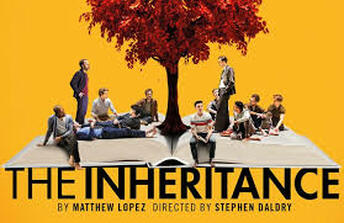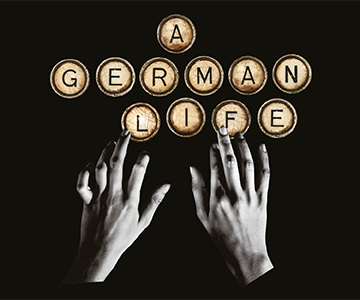 Dinner at Vegan Hotel Saorsa 1875by Randi / November 4, 2022
Dinner at Vegan Hotel Saorsa 1875by Randi / November 4, 2022The Doctor on the West End: Has a Show Ever Made Me So Angry? Let’s Find Out!
It’s Theatre Thursday! This is a rant y’all! The Doctor closes at the Duke of York’s Theatre this Sunday. BYEEEEE.
The Doctor was more frustrating than waiting all night in A&E to get four minutes of face time, because at least at the hospital you know the NHS is doing their best with limited resources and you can blame Tories for that, but who can we blame here? Society? The writer? Tories? Tories it is.
This show was an exercise in trying to remain calm, and seated. I think I’m extra frustrated because it so could have been something powerful…or at least said something coherent and not just spit chaos at a stage. There are lots of issues I’m going to point out with this play about a doctor who follows hospital policy and then gets cancelled by the whole world for it, but there are two main ones I’ll focus all thoughts around.
Number 1: What the fuck.
The plot of The Doctor focuses on Juliet Stevenson’s character (I’m gonna call her Juliet) who is a cold but brilliant doctor. So maybe her bedside manner sucks, but she is always going to make the right call medically, which, I don’t know about you, but is what I want from a doctor. She knows her shit, and some dialogue in the first few minutes makes clear she’s a better doctor than her esteemed colleagues. When a teenage girl is dying on Juliet’s shift, a priest appears and insists on going into her hospital room to give her the last rites. The Doctor says, well, first of all I don’t know who you actually are, stranger off the street; b) I haven’t heard from her parents to give this permission/instruction which I would follow if they said so; and also the girl is very out of it but peaceful and I think it’s best for her to die peacefully and not panicking if she finds out she is dying. (And lo, she was right, because we find out later that some dick-faced intern asks the girl if she wants the last rites while the priest is making his ruckus, and so the girl does panic and does die panicking. you f-ed it, you piece of shit intern.)
So, back to my main issue: what the fuck.
I don’t understand why this isn’t a two minute discussion. She followed hospital policy and chose NOT TO ALLOW A STRANGER INTO A DYING MINOR’S ROOM. A stranger off the street who just shows up and says he is a priest, says that the parents called him and asked him to come – but the parents didn’t call the hospital to tell them to let him in. Is that just a cool thing to do in this country? I know you don’t have as many regulations on things like this as the USA does but really? I can just walk into a dying child’s hospital room even if the staff is like, hey now wait? that’s fine? So you’re saying she SHOULD have let a stranger into a child’s room to upset her when she was dying, without hearing from any guardian and even though her decision was supported by hospital policy.
Given the sense I just made at you, I thought maybe this play was going to be about how society has forgotten what common sense is, and the hubbub caused by this event would be shown for the insane circus that it was. Like, we were supposed to be this angry with how irrational all of this is, that was the intention. I assumed that the conflict would be portrayed as the whole world against Juliet when it was clear that Juliet was right, a case of someone being ‘cancelled’ unfairly (even though that sentiment is overblown since people simply don’t understand what words or consequences are but I digress). However, it seemed the opposite, and people approve of her facing professional consequences for her character unrelated to her job. People that are actually allowed to dress themselves in the morning (slash write the ‘real’ reviews for the Guardian et al) apparently think she was wrong – which okay, you might have made the opposite decision since both were allowed. You might have thought she should have let the stranger into the dying child’s hospital room with no proof that he was who he says he was. But was she wrong enough to get fired? To be publicly shamed, to be threatened, to be the subject of this shitstorm, to have bricks thrown through her window, to be yelled at by irrelevant activists on TV? no no no, bless your heart. But it seems the vast majority of people think this was all warranted.
Another wtf: where on earth were the hospital’s lawyers at all these subsequent board meetings? I worked in medical law for a few years and this is a big old piece of unrealistic nonsense that at no point in the first five seconds of the debacle did the lawyers show up and say “so, she followed hospital policy…that’s all there is to it. That’ll be 3000 pounds please.” It’s kind of laughable that this wasn’t a legal drama, as it would have been in real life. I know you love your chat shows but solving a regulatory question on one is some soft-ass shit.
Speaking of those irrelevant people on the TV panel: if we were supposed to be angry and frustrated as we see these various irrelevant voices losing the plot, then great, that worked. But it honestly seemed like we were supposed to care? what various academics and scholars and action group workers thought about this situation where a doctor followed hospital policy? Are you out of your gottam mind? How is any of this at all relevant or worth considering? How did it become about her character unrelated to being a doctor and — this is the problem– how was that not presented or interpreted as unreasonable?
The worst thing about that panel show, besides everything, was that one of those irrelevant people had the gall to make her apologize for the harm her ancestors have done to other people. I mean. She’s Jewish, by the way, if there were ever doubt about the antisemitism in London theatre that I go on and on about. Again, if the audience was supposed to grasp that this was all awful and insane to be doing to her, then I’m down, but the way it was presented and definitely received was more like ‘yeah this is good she needs to apologize for the way her ancestors have…been persecuted for thousands of years.’ I am so angry that the show put forward these tropes about Jews not to show that they are tropes or subvert them, but to present them as valid. The antisemitism in this show could have been framed to show why she faced unreasonable consequences, but instead it felt like it was a reason supporting the backlash that we were supposed to accept. Is that a problem with the direction, or the writing? Or, did they just want Jewishness to be part of the alleged villainy?
For the people who disagree: how is this not simply a case of “this doctor, who is a good doctor and did not do anything wrong medically or in terms of her hospital’s rules and regs, is not a very warm person and people really don’t like her and even though she didn’t do anything ‘wrong’, she made an unfeeling but permissible call on something completely unrelated to being an actual doctor, which I don’t like, but understand”? You can think that and accept that, but to then force all these insane consequences as a result of not liking a largely sensible choice she made is, well, absolutely insane.
I’m so frustrated because yes, it was about how this simple question, of whether or not the doctor made an appropriate call, became a question of whether or not she was a good person. But instead of saying ‘yeah and isn’t that irrelevant to what’s happening, that that’s what the societal conversation morphed into? isn’t that awful?’ the play seems to be saying that it’s VALID! It is NOT! And it wasn’t framing it as a ‘isn’t this complicated’ question either! It is NOT supposed to be complicated.
Another wtf as a palate cleanser from the bigger issues: the time with her teenager friend didn’t pay off. We learned a little more about her but nothing to explain why we listened to her talk for 15 minutes about having sex in high school. Was this a test.
Issue number 2: The play presents abortion pills as dangerous.
The part that has really stuck with me and made my blood boil is that this show vilifies abortion pills in an ignorant, dangerous way. FYI abortion pills are very safe, and effective the majority of the time. They are able to be ordered online in many countries because this has been proved, as long as you take them as directed. The teenage girl in question died after ordering and taking them in secret — the play repeats this in a way that presents the pills as the killer, full stop, no context. Abortion pills killed her. But if you listen closely, you learn she was way farther along (I think I remember she was 4 months pregnant?) than you can be to take the pills. THAT is why she had a fatal reaction. You can only take the pills if you are under 10 weeks along. With reproductive rights under attack it’s easy to see audiences largely accept from this story that abortion pills are dangerous, and thus susceptible to Tory swaying that they should be outlawed, or less easily available. If there was any line where a character clearly explained that they are usually safe and shouldn’t be vilified, it was drowned out in the onslaught of clear but false messaging that they are dangerous and fatal. This is absolute bullshit, and so much of the dialogue around the pills reminded me of Republican propaganda. I truly cannot believe that anyone who cares about reproductive freedom could sit there and accept what was being fed to mostly older white audiences, the demographic that loves to vote these rights away.
OH I ALMOST FORGOT MY BIGGEST ISSUE: People were all ‘she made such a meanie decision to not let the priest in BECAUSE SHE’S JEWISHHHHH! that’s why! she hates Catholics!!’ (And the play doesn’t really do anything to contradict that unbelievably offensive bs). And aside from all the other good reasons for her decision, she says she didn’t know if the girl was really a devout Catholic, since she wasn’t lucid and her parents weren’t around. The villagers with pitchforks argue “but she had a cross necklace!”, and Juliet says “well a lot of young people wear them it’s trendy” — TRUE. What my biggest issue is: at no point does anyone say the very valid argument that, it’s well within reason for the doctor to have questioned whether the girl was a devout Catholic SINCE SHE HAD HAD AN ABORTION! THAT’S LIKE THEIR ONLY RULE!!!!! jfc.






1 Comment
So ok after the initial prompt in italics I was going to remind you that Back to the Future the musical made you angry but mannnnn this was a whole other level, complete trash what the actual. Maybe let’s pretend it was very poorly presented satire played so straight you couldn’t tell?? I am sorry you sat through this dreck.